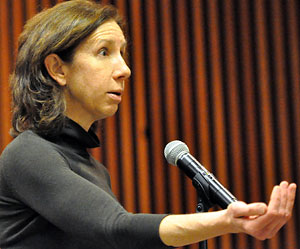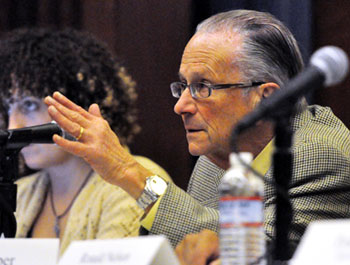At subdued Boalt Hall forum, Nov. 9 protest clash gets a hearing
A Police Review Board forum drew a sparse crowd, but elicited powerful testimony from students, faculty and others who said they were victims of, or witnesses to, police violence during November's Occupy Cal protests.
February 14, 2012
In contrast to December’s annual meeting of the campus Police Review Board — at which scores of people demanding to testify about police conduct during last year’s campus protests were told to come back at a future date — a PRB forum arranged for the express purpose of hearing such testimony drew a surprisingly thin crowd of several dozen on Monday night.

Celeste Langan (Peg Skorpinski photos)
Several of those who did attend, noting the empty seats in Boalt Hall’s Booth Auditorium, pointed to what they perceived to be a lack of official action on the findings of an earlier PRB investigation into 2009’s Wheeler Hall protests.
Speakers at the nearly three-hour session included both students and faculty members who clashed with police on Nov. 9, 2011, over Occupy Cal’s efforts to set up an encampment outside Sproul Hall. Among them was Celeste Langan, an associate professor of English and acting director of the Townsend Center for the Humanities, who told the five-member board she’d been surprised by “the violence with which I was arrested.”
Langan, emphasizing the civil-disobedience aspect of her participation, recalled holding out her hand to police that day and saying “Arrest me, arrest me.” But instead of taking her arm, she went on, “a policeman grabbed me by the hair and yanked me forward and made me lie on the ground and handcuffed me.”
Associate professor Geoffrey O’Brien, her English Department colleague, noted that many protesters, squeezed between police lines in front and tents and other protesters behind, were physically unable to comply with police orders to move. O’Brien, who said he’d been struck by an unidentified Alameda County sheriff’s deputy, added that police commands often could not be heard and that batons were used on students, faculty and others “without provocation.”

Jesse Choper
Amanda Armstrong, a graduate student who said she was hit by police batons “at least a dozen times” on Nov. 9, complained that while protesters set up tents “in conscious violation” of the campus’s Student Code of Conduct as an act of free speech, police treated them as though they were criminals.
“Because this act violated the code, the administration sent in the police to take down the tents,” she said. But police continued to act with aggressive force, she added, even after the tents were gone.
“To them, we were remaining at the scene of a crime, or a riot, or were refusing to disperse when ordered,” Armstrong said. “It wasn’t about the tents anymore. It wasn’t about the student-conduct code, about campus policy or community norms. It was just about policing.”
Bahar Navab, president of the Graduate Assembly, made a plea for increased communication between students and administrators, citing a lack of engagement by campus officials as a contributing factor in how the conflict played out.
“I guess I’m wondering, what is the role of the administration?” she said. “You can’t just say, ‘This is our policy, but we’re not responsible for the fallout.’ “
Similarly, Law School dean Christopher Edley, who is looking into systemwide responses to student protests at the behest of UC President Mark Yudof, cited confusion over the amount of discretion police had in acting as they did. He urged the five-member campus board to determine “what policy judgments were made by administrators, as compared with the tactical choices that were made by the police.”
“I think it’s very important for police officers individually, and for the police department as a whole, to be held accountable for the professionalism with which they acted, or failed to act,” Edley said. “But I don’t think it’s appropriate to blame them for executing policies that were not of their own making … nor is it possible for us to understand what the administration did or didn’t do unless you clarify that line for us.”
The Police Review Board, chaired by law professor Jesse Choper, will hold a follow-up session at 7 p.m Wednesday in Booth Auditorium. Another hearing, at which designated students, faculty members and law enforcement officials will show video and present verbal testimony, is set for March 5, and the panel intends to conduct interviews with members of the administration over the coming weeks.